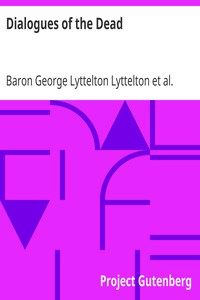| Author |
Lyttelton, George Lyttelton, Baron, 1709-1773 |
| Author |
Montagu, Mrs. (Elizabeth), 1718-1800 |
| Editor |
Morley, Henry, 1822-1894 |
| Title |
Dialogues of the Dead
|
| Note |
Dialogues XXVI-XXVIII are by Elizabeth Montagu.
|
| Contents |
I. Lord Falkland; Mr. Hampden -- II. Louis le Grand; Peter the Great -- III. Plato; Fenelon -- IV. Mr. Addison; Dr. Swift -- V. Ulysses; Circe -- VI. Mercury; An English Duellist; A North-American Savage -- VII. Pliny the Elder; Pliny the Younger -- VIII. Fernando Cortez; William Penn -- IX. Marcus Portius Cato; Messalla Corvinus -- X. Christina, Queen of Sweden; Chancellor Oxenstiern -- XI. Titus Vespasianus; Publius Cornelius Scipio Africanus -- XII. Henry Duke of Guise; Machiavel -- XIII. Virgil; Horace; Mercury; Scaliger the Elder -- XIV. Boileau; Pope -- XV. Octavia; Portia; Arria -- XVI. Louise de Coligni, Princess of Orange; Frances Wasingham, Countess of Essex and of Clanricard; before, Lady Sidney -- XVII. Marcus Brutus; Pomponius Atticus -- XVIII. William the Third, King of England; John De Witt, Pensioner, of Holland -- XIX. M. Apicius; Darteneuf -- XX. Alexander the Great; Charles the Twelfth, King of Sweden -- XXI. Cardinal Ximenes; Cardinal Wolsey -- XXII. Lucian; Rabelais -- XXIII. Pericles; Cosmo de Medicis, the first of that Name -- XXIV. Locke; Bayle -- XXV. Archibald, Earl of Douglas, Duke of Touraine; John, Duke of Argyle and Greenwich, Field-Marshal of His Britannic Majesty's Forces -- XXVI. Cadmus; Hercules -- XXVII. Mercury; And a modern fine Lady -- XXVIII. Plutarch; Charon; And a modern Bookseller.
|
| Credits |
Transcribed from the 1889 Cassell & Company edition by David Price
|
| Reading Level |
Reading ease score: 64.3 (8th & 9th grade). Neither easy nor difficult to read.
|
| Language |
English |
| LoC Class |
PR: Language and Literatures: English literature
|
| Subject |
Imaginary conversations
|
| Subject |
Dialogues, English -- Early works to 1800
|
| Category |
Text |
| EBook-No. |
17667 |
| Release Date |
Feb 3, 2006 |
| Copyright Status |
Public domain in the USA. |
| Downloads |
363 downloads in the last 30 days. |
|
Project Gutenberg eBooks are always free!
|

